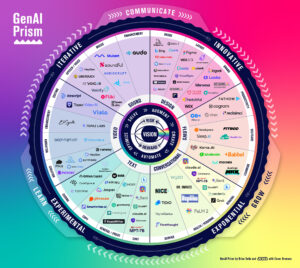
Originally published in the Shutterstock newsletter as a two-part series…Part I / Part II
To keep things consistent, I didn’t change the headline. However, for the sake of reading this post in context, SMO should be part of an overall SEO strategy (SEO + SMO = Amplified Findability in the traditional and social Web)
In the previous post, I discussed the importance of social objects (images, videos, blog posts, comments, status updates, wall posts, etc.) in a Social Media Optimization campaign. This month, I am going to explore the five major ways that these social objects can be contextualized: keywords, titles, descriptions, tags and/or links.
Keywords
Keywords are the terms that people use to find relevant information in searches. When selecting keywords for your social objects, it’s important to remember that the keywords used by customers and influencers are not always what you think they’d be. To help, I suggest visiting Google Adwords to generate keyword ideas:
https://adwords.google.com/select/KeywordToolExternal
It’s also important to use Web analytics on your Website or blog to see how people are phrasing searches to arrive at your site. This allows you to calibrate your keywords accordingly.
Titles
Titles refer to the official designation or name of your content. Instead of focusing on a sensational or controversial title as in other forms of marketing, headlines on the social web should feature title tags and keywords upfront. In Social Media, your headline must contain the keywords that explicitly match the search patterns of the people you hope to reach.
Descriptions
Descriptions further refine the context of your social object to entice visitors to view and circulate your content amongst their social graph.
The description field is your chance to frame an object in order to further convince the viewer to click through to it. A good rule of thumb when writing descriptions is to make sure that your copy includes at least three keywords related to your business/brand and target viewers – without reading as text explicitly written to manipulate search results.
Tags
Tags are keywords that further group and organize your Social Object within the social network.
Tags are based on folksonomy, a system of classification derived from the practice of collaboratively creating and managing tags to annotate and categorize content within specific networks. In order to make sure that your tags are categorized most effectively, make sure they include keywords related to the branding and marketing of your product, as well as its competition.
Links
Links are the currency of the Web and serve as the primary undercurrent of search engine optimization. As in SEO, links help fuel traffic (as measured in views) to your social object, and contribute to your ranking within initial search results. Links equate to authority, and by amassing an extensive inbound linking infrastructure, the visibility of your social object can earn significant inertia. This, in turn, allows it to traverse from resident social network searches to appear in matching results in traditional search engines such as Google and Yahoo.
For example, sharing a link on Twitter and Facebook that points back to a video on YouTube extends the reach of the video to people in one or more forums, potentially connecting them to your content. If individuals within these outside social networks decide to share the video across their social graphs, we further extend the visibility and the authority of each object.
No brand is an island. As many online activities begin with a search, creating and deploying strategic beacons of information within targeted social networks creates roads and bridges back to you or the brand you represent. This “inbound” form of unmarketing, enriched through strategic SMO, helps us connect our value and our story to those who are already searching for solutions and guidance. We’re either part of the results or we’re unfortunately absent from further consideration.
While we can’t be everywhere at all times in social media, social objects can serve as our representatives in order to spark meaningful conversations now and in the future.
Connect with Brian Solis: Twitter, LinkedIn, Tumblr, Facebook
—
Pre-order the next book, Engage!

—
Click the image below to get the current book, poster, or iPhone app:



—
Image Credit: Shutterstock





Brian, you are THE BEST. Thanks!
Wow, thank you Laurie!
“No brand is an island.” I love it!
This information is going to enrich what I bring to the table in so many ways.
Truely grateful for the guidance!
Exactly. I commented on your previous post emphasizing the synergy effect of SEO and SEM working togther, and this post is explaining this strategy perfectly.
One question:
How would you compare the efforts B2C should make versus B2B? Would a B2B company use a different strategy, or just different tactics?
Thanks again,
Uri
How about SMO is SEO. I don't see anything new hear…
Will, many marketers view SEO as a strategy for amplifying visibility within traditional search. I don't see many SEO pros manipulating content at the object level to boost results specifically within social networks, and when they do, it's treated as a separate project away from our traditional web work and billed under a line item of SMO.
Hi Brian, I know of plenty SEO professionals who optimize social objects within social networks (i.e. Youtube) to improve rankings. These efforts are usually done with the goal of achieving both social and “traditional” search results. I see you're point that it is often a separate line item, but I think calling SMO the NEW SEO implies that more traditional SEO campaigns are no longer important. There is still SOOO much long hanging fruit with regards to Fortune 500 companies getting their on-page SEO ducks in a row (this study came out today http://www.conductor.com/news/conductor-study-r…). I wouldn't want this definition to confuse marketers about where their money is best spent with regards to SEO.
Let's make sure that everyone walks away from this message, “SMO is important as a function of an overall SEO strategy….”
Yes…well put Brian
I like the breakdown! I love using keyword tools. Your keyword section brought up an interesting point about thinking of the view of the visitor and how they find you. I watched my own search behavior change, typing in 4 words into Google searches. I found longer tail keywords were rising like crazy, when before they were assumed to be a smaller source of traffic. I learned my lesson: just keep adjusting.
“Creating and deploying beacons of information” is a nice way to think of it, well said. Recently for marketing my music, I've enjoyed using new social networks, only if they were optimized for representing my label. With a proper plan in mind, social media optimization came alive for me. Adding value to your story seems to be the goal.
I'm picturing a seesaw with SEO on one side and SMO on the other. Great article Brian!
While I agree with your point that “links drive traffic” I've read that links generated via social media (e.g. a tweet or FB update) don't carry nearly the same SEO juice as backlinks from a reputable website or blog (e.g. blogroll listing). I think it's important to make a distinction between the value of one well-placed link versus 50 links generated from the re-tweet of a blog entry. Who knows, maybe there'll be a Part III…
You are right…and indeed, a part III is already in the works as it relates to this: https://www.briansolis.com/2010/02/the-human-alg…
Hey there Brian, found your site through Technorati… It's damn great! This post just earned you a subscriber for life… Most people still aren't SEO literate, it's hard to imagine how many years it will be until most online “marketers” get their SMO straight…
Great post, keep up the good work!
Garrett Miller, Young Entrepreneur
Great insight in the typical “Brian Solis” style, I think SMO depends a lot on the human internet sharing capabilities in comparison to the much techy sibling SEO, I would look forward to the third installment of this series as It would be interesting to know how can we easily catch up with both of them as sometimes SEO ruins the effectiveness of a well written copy.
Loved your post as well as the comments/conversation that resulted. Thank you, Brian, for providing your insights and a sense of clarity to this topic.
I really like this! it's a new paradigm for how we have to think about how we get our content noticed. I love it because it goes back to the one eternal truth that the way to success is by being good and being prolific.
“To keep things consistent, I didn’t change the headline. However, for the sake of reading this post in context, SMO should be part of an overall SEO strategy (SEO + SMO = Amplified Findability in the traditional and social Web)”
Yes, any good/competitive SEO will make great use of social media.
Yes, indeed.
For those readers who are not SEO professionals, but instead those who employ them or should consider employing them, this post serves as an overview of optimization requirements that extend beyond the traditional web and static web sites. Marketers need to come to the table with a balance of needs and expectations in order to collaborate intelligently and effectively. This is truer today than ever before as businesses are now factoring content production of social objects into the overall mix.
Definitely agree on that one. Marketers need an understanding of SEO/social media and how they work together. I think you did a good job of covering the important elements here, and thanks for clarifying, looking forward to reading the book
Brian, A clear and concise view of SMO. Thanks for sharing.
Thank you Ryan!
The marketers have moved on to more nuanced grounds but the argument in the boardroom can remain somewhat binary like at times. “yesterday we were Nº whatever on Google for our keyword, now we are down to Nº whatever-3, WTF SMO?”
Every CEO can Google their marketing teams` efforts and seemingly verify their efficacy in a moment. Seemingly: And that´s the rub with SMO, it´s just not so immediately apparent to the non-marketeer what is going on or how to get a grip if it´s all stacking up.
Paul, I can't disagree with you. Closing the gap is part of the job as “we” know it's critical to findability…
Excellent resource. Thanks for the insights.
Thank you…
Quality. How well can SMO be tracked? What devices would we use?
And wouldn't if be nice if we actually could be in all the places we wanted to be? We knew of all the people who actually posted quality information about what we want 🙂 I like the post. I'll definitely be back.
Thanks
Eric Saylor
Exactly.I agree with you. Also see http://www.aceaffiliates.com/affiliate-educatio…
Hi Brian. A great summary of SEO basics as they relate to SMO. I think until recently traditional SEO companies haven't really understood SMO and those who market in the socila media space have largely been ignorant of SEO. But times are changing. Smart marketers are integrating all their optimisation efforts. It's all about visibility.
Hi Brian. While I definitely agree that social media is an integral part of any SEO campaign, I have a major problem with the term “Social Media Optimization.” I just published a blog post in response to your blog today – http://area203.com/news/don%E2%80%99t-call-soci… – I would love your feedback.
As an intermediate Web user, you do not have to be a fan of sociable mass media optimisation. However, as a web site proprietor, you do require to experience that it lives and be careful …
This calendar month, I am departing to explore the five older paths that these friendly objects could be contextualized contacts.
Learn how to fully maximize your content's potential using social media resources.
This is a trend that’s only now gaining momentum; as Nielsen observes, “Social Media is becoming a core product research channel.
if one values his time when needs to gather SEO and SMO key data, one should use this free online tool called miniStatus (http://ministatus.com). be aware that there are always a pdf file generated for each query, ready for download.
Learn how to fully maximize your content's potential using social media resources!
we have to implement and manage a Social Media Optimization program around our content to increase visibility in these new …
Well right!Social media can be considered anything that can help build a community around.Social media helps buy taking many different forms including text, images, audio, and video and also popular social mediums include blogs, message boards, podcasts, wikis and vlogs to get more traffic and SMO techniques can drive huge amounts of people to a website which in turn does the same as SEO.Good article!
Farmville Secrets
In the recent change done by the search engines it has become very hard to promote any web sites. The best alternative for the traffic generation is the social media optimization. This post has covered all the points regarding the smo.
software solutions designed to exploit the competitive advantage given by …
we have to implement and manage a Social Media Optimization (SMO) program around our content to increase visibility in these new …
hi, envisioning and supplying methodologies and software solutions designed to exploit the competitive advantage
thank you nice post
This is a good strategy to increase your popularity and at the same time rank up in search engines. SEO and SMO are great methods that increases your business’s income.
It is useful to people who are not even know what is smo and what is done in smo.
Excellent